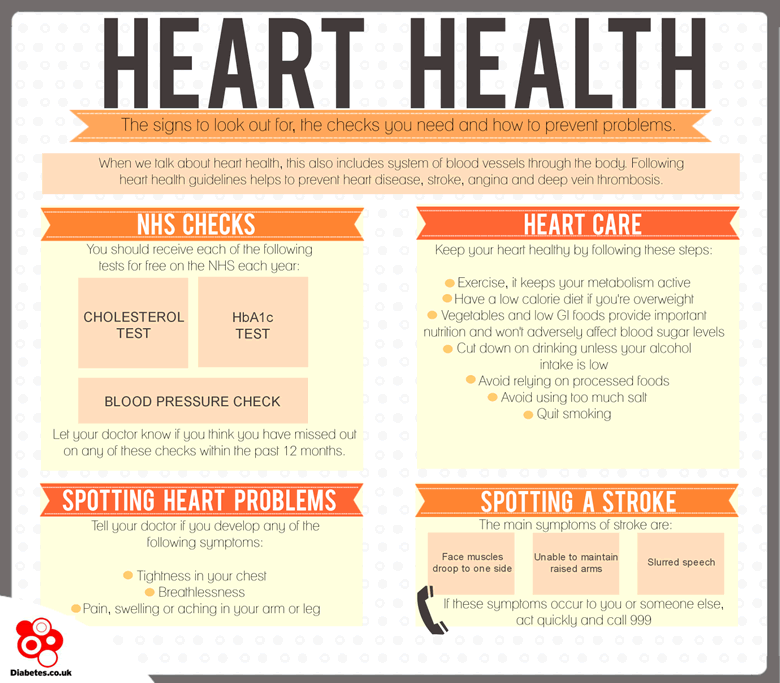People with diabetes are prone to heart problems. It’s one of the most common diabetic complications.
Prolonged exposure to high blood glucose levels weakens the arteries, among other things, which increases the chances of blockage.
Keeping a healthy heart, therefore, is essential. There are a number of ways to do it.
Heart care
There are several things you can do to prevent heart disease:
- Exercise: Physical activity keeps your metabolism active
- Maintaining a healthy weight: What constitutes a healthy weight depends on the person. Your doctor can advise you
- Eating plenty of vegetables and low-GI foods: Non-starchy vegetables are a great source of fibre, which helps prevent the build-up of cholesterol. Low-GI foods – that is, foods that have a low rating on the glycemic index, a measure of a food’s effect on blood glucose levels – prevent high blood glucose levels. This, in turn, reduces the risk of artery damage
- Drink less: Unless your alcohol intake it already low, reducing the amount of alcohol you drink can help protect your heart. Heavy alcohol consumption increases the risk of high blood pressure and weakens the heart muscle.
- Eat less processed foods: A number of studies have suggested that processed food increases the risk of heart failure by causing chronic inflammation that blocks blood vessels.
- Eat less salt: Like alcohol, consuming too much salt raises your blood pressure.
- Stop smoking: smoking damages the lining of the arteries, which leads to the build-up of fat.
The importance of heart care can’t be overstated. 80 per cent of people with diabetes die from coronary heart disease.
NHS checks
There are a number of tests that can be conducted to determine heart disease.
Cholesterol test
The cholesterol test is simple. All you need to do is provide a little sample of blood. If your cholesterol levels are high, you won’t be left to it. Expect advice and support.
Blood pressure test
High blood pressure is a common health problem, affecting around 30 per cent of adults in the United Kingdom. Most people don’t know they have it, because it doesn’t present symptoms.
You’ve probably had a blood pressure test before. It involves a cuff being placed around your upper arm and tightened.
HbA1c test
The HbA1c test provides a longer term indication of your blood glucose control than a finger-prick test. Several studies have linked healthy HbA1c levels to a reduced risk of heart disease.
To prevent heart disease, make sure you get as close as possible to the HbA1c target of 6.5%.
If you have type 1 diabetes, that target is 7.5%, because a lower target would increase the risk of hypoglycemia
If you can comfortably manage 6.5% as someone with type 1 diabetes, this is ideal. Note that these targets are generalised; healthy HbA1c levels vary from person to person.
Speak to your healthcare team to get a more personalised figure.

Spotting heart problems
If you can’t prevent heart disease, it’s important to know when it’s happening. Familiarise yourself with the symptoms:
- Tightness in the chest
- Breathlessness
- Pain in your arm or leg
- Palpitations
- Faster heartbeat
- Weakness or dizziness
- Nausea
- Sweating
If you experience these symptoms, contact your doctor immediately. A timely diagnosis and quick treatment can prevent things from getting worse.
Perhaps you’ve already been diagnosed with a heart condition. If so, be sure to contact your doctor if you experience new symptoms, or if your existing symptoms get worse.
Spotting a stroke
Stroke can be life-threatening It occurs when the brain isn’t receiving a proper supply of blood. If stroke is treated quickly, the damage can be reduced.
So you need to know the signs and symptoms. If you or anyone else experience the following, call 999 immediately:
- Facial muscles drooping
- Unable to lift both arms due to weakness or numbness
- Speech impairment: your speech might be garbled or slurred, or you may not be able to speak at all







